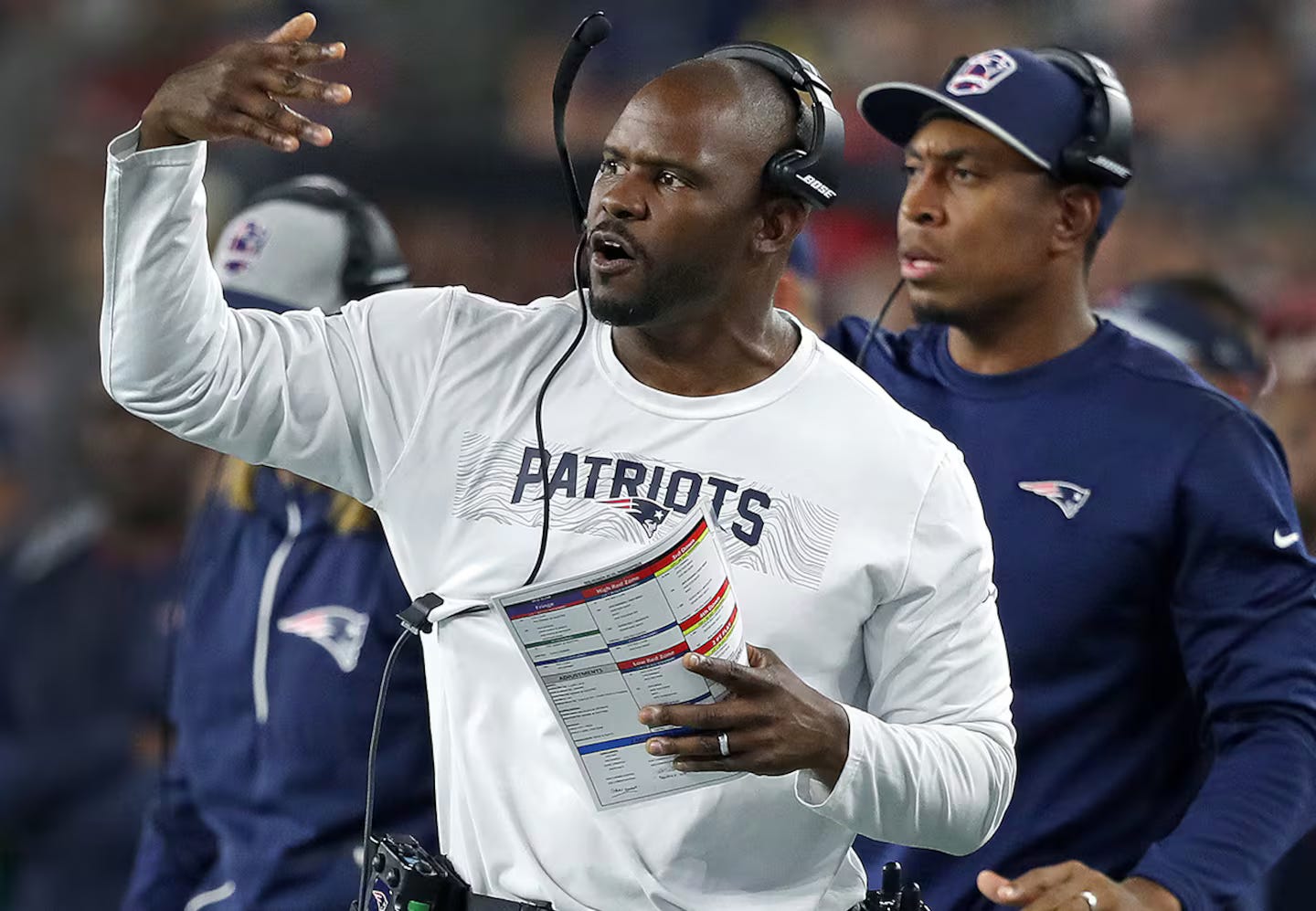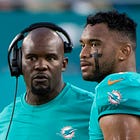Jerod Mayo, Brian Flores, and the Limits of “Discrimination”
Remember the Brian Flores lawsuit? Nearly three years ago, Flores sued the NFL, as well as the Giants, Dolphins, and Broncos, for racial discrimination in their hiring of head coaches. It got a lot of attention at the time (I wrote about a bunch of newsletters about it), but the suit has mostly stalled. A federal judge split the case up, ruling that the claims against the league and the Dolphins — who had contracts with Flores mandating arbitration for employment disputes — had to be handled by the league’s arbitration process, but that the claims against the other teams could proceed. The NFL appealed the second part of the decision, and there hasn’t been much news on that front in nearly a year.
But outside of that, things have gone pretty well for Flores. Despite many people warning that the lawsuit would kill any future he might have with the league, he has not been out of work since. He was a special assistant for the Steelers in 2022, and has been the defensive coordinator for the Minnesota Vikings the last two seasons. His work with the Minnesota defense — which finished 5th in the league in points allowed this season — has been so well-received that he is considered a candidate for one of the five head coach openings in the league right now; the Bears and Jets have already requested interviews1 with him.
Plus, there have been a bunch of other stories that emerged about his time in Miami, specifically about his inability to get along with Tua Tagovailoa, which suggest that there may have been football-related reasons for firing or not hiring Flores.
So you can see how people might look at his example and be skeptical about his claims about racial discrimination.
On the other hand, there’s Jerod Mayo, the first Black head coach of the New England Patriots, who was fired after just one season. I don’t want to be in the position of defending Mayo, who did not exactly cover himself in glory in his one year as New England’s coach. But the point is that looking at each specific case obscures the structural issue. For any individual coach, you can of course find reasons to hire OR fire him if you look close enough. But Mayo has now become the SIXTH Black head coach to be fired after only one season since the Rooney Rule was implemented in 2002.2 It’s only happened 16 times in TOTAL in that period, so Black coaches make up 37.5% of the coaches fired after one season, despite constituting only ~17% of all coaching hires in that period.
In other words, when you zoom out and look at the situation that Black head coaches face AS A GROUP, it is hard to deny that they are being treated differently than their white counterparts. Black coaches wait longer to get hired, get fewer chances, and are given less time to establish themselves than white coaches. And yet, if your only response to this problem is to look for evidence of “discrimination,” then you may never find any.
After all, was Flores discriminated against? Was Mayo? These things aren’t just hard to prove legally — they are hard to prove epistemologically. It is impossible to know how structural barriers affect individual cases, and trying to answer those questions is kind of a distraction. Trying to measure precisely how much racial discrimination Flores or Mayo faced is both impossible and ultimately irrelevant. The main point is that there ARE race-based inequities in how Black coaches are treated by the NFL. But our legal framework, and our individualistic culture, fixates on discrimination against individuals, so we get caught in an endless loop of debating a specific individual’s objective merit. Solutions aimed at a class or a group identity are frowned upon, or in some cases legally proscribed, even though that’s the entire source of the problem.
To put it very bluntly: You cannot solve a problem like racial discrimination, which is based on one’s membership in a social group or class, with the focus on individual rights and freedoms we usually celebrate in capitalist liberal democracies. Many liberals do not like to admit this, because they have been brought up to cherish “individual rights and freedoms” as the cornerstone of a free society. And so they think the most important question is whether a specific person — in this case Brian Flores — was discriminated against.
But sometimes the most important thing is NOT what happens to you individually. Despite all the things that make you a precious, unique little snowflake, sometimes the most important thing is your membership in an oppressed class. And until you are willing to identify with that class, and even prioritize its empowerment over your rights as an individual, you will not actually advance. After all, what force on Earth is weaker than the feeble strength of one?
It should be said, though, that one of the allegations in Flores’ lawsuit is that these interviews are often shams done only to satisfy the league’s Rooney Rule, which forces teams to interview at least two non-white candidates, and it’s certainly possible that’s all these will be as well.
For reference, it was Art Shell in 2006, Hue Jackson in 2011, Steve Wilks in 2018, David Culley in 2021, Lovie Smith in 2022, and now Mayo this year.




